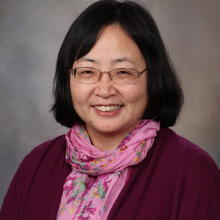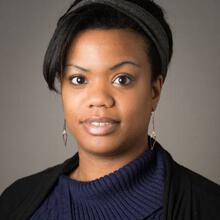Featured Experts
| Expert | Description |
|---|---|

Hongfang Liu, PhD |
Hongfang Liu, PhD, program director for informatics at Mayo Clinic, is experienced in using clinical data for translational science research and improving health care delivery. In the corresponding video recorded for the NCATS “I Am Translational Science" series in August 2020, Dr. Liu explains how collaborating with experts in other disciplines to build the National COVID Cohort Collaborative (N3C) Data Enclave will advance the science behind COVID-19 to deliver health care interventions and treatments. Dr. Liu has also been leading the Natural Language Processing (NLP) subgroup for the N3C—a secure platform of harmonized clinical data—for the past year. The group has has created a process for extracting important variables from the free text or unstructured portion of the electronic health record (EHR). Liu’s process will allow researchers to test their algorithm on data provided by the N3C to see how well it can de-identify unstructured data. Details about the infrastructure of the project can be found on the N3C NLP GitHub wiki page. Dr. Liu and Mayo Clinic have also been key contributors to NLPSandbox.io, an open benchmarking platform that was recently launched. Led by Thomas Schaffter at Sage Bionetworks, the NLPSandbox streamlines the development and benchmarking of tools that are robust, reusable, and cloud-friendly for public and private datasets. The project has onboarded Medical College of Wisconsin as their first data partner. Additional data from Mayo Clinic and University of Washington will soon be incorporated, enabling multi-site evaluation and assessment of whether tool performance generalizes to multiple datasets. The service is now open for submissions. Learn more about how to get started from the NLPSandbox blog post. A manuscript describing the pilot study that introduced NLPSandbox.io and performance of state-of-the-art algorithms is currently in the works and will be submitted to a peer-reviewed journal in the upcoming months. Follow Dr. Liu on Twitter: @hongfangliu For more information on Dr. Liu's work, please view her Mayo Clinic profile. |

David Ellison, MD |
David Ellison, MD is a nephrologist and professor of medicine, physiology, and pharmacology. He also directs the Oregon Clinical and Translational Research Institute (OCTRI) and is associate vice president for Clinical and Translational Research at Oregon Health & Science University (OHSU). Dr. Ellison is an active member of N3C's Acute Kidney Injury (AKI) Domain Team. This team aims to investigate COVID-19 risk factors associated with kidney injury and recovery, as well as use of angiotensin-converting enzyme (ACE) inhibitors and angiotensin II receptor blockers (ARBs) in kidney disease. The team's research involves the assessment of risk factors, predictors, duration, dialysis need and timing, clinical measures, and interventions for COVID-19-related complications of the kidney. The team also collaborates with other nephrology domain experts. Dr. Ellison is board certified in internal medicine and nephrology. His research centers on the effects of diet on blood pressure, mechanisms of salt transport by the kidney, the genetic basis of human hypertension, and on diuretic treatment of edema. A long-term focus of his research is the thiazide-sensitive NaCl cotransporter (NCC). For more information on Dr. Ellison's work, please view his OHSU profile. |

Jihad Sami Obeid, MD |
Co-director of the Biomedical Informatics Center (BIMC) at Medical University of South Carolina (MUSC) Dr. Jihad Obeid is the Co-director of the Biomedical Informatics Center (BMIC) and SmartState Endowed Chair in Biomedical Informatics at the Medical University of South Carolina (MUSC). He is a pediatrician who was formally trained in Medical Informatics at the Division of Health Sciences and Technology, a joint Harvard-MIT fellowship program. Dr. Obeid played a key role in the onboarding of MUSC to the National COVID Cohort Collaborative (N3C), and is a member of the N3C Collaborative Analytics workstream. See Research Profile. |

Charisse Madlock-Brown, PhD, MLS |
Assistant Professor of Health Informatics and Information Management and leader of the UTHSC Research Pipelines labs.
Charisse Madlock-Brown’s specialty is health informatics, the growing use of big data in medicine that someday soon will tell the world what underlying conditions were most fatal in COVID-19 or how drugs those patients were on when they got to the hospital complicated their treatment. None of this is known. The details—and countless more—are in the tens of thousands of electronic medical records COVID-19 is generating in hospitals across the nation. Madlock-Brown, an assistant professor at University of Tennessee Health Science Center, has just received a National Institutes of Health grant—her first—to drill down in the records of 70 million patients, looking at those with two or more underlying conditions, how often they occur, in what combination and what it costs to treat them. Read entire article by Jane Roberts May 29, 2020: At UTHSC, WC Handy's cornet symbolizes innovation, team science.
Charisse also supports informatics efforts for the National COVID Cohort Collaborative (N3C) as a member of the Collaborative Analytics workstream with Dave Eichmann, her PhD advisor from her alma mater, the University of Iowa.
|

Lauren Gardner, PhD |
Associate professor at Johns Hopkins Whiting School of Engineering and creator of the JHU COVID-19 Dashboard. Johns Hopkins' dashboard: The people behind the pandemics's most visited site - July 11,2020 In response to the ongoing public health emergency caused by COVID-19, Dr. Gardner and her team developed an interactive web-based dashboard, hosted by the Center for Systems Science and Engineering (CSSE) at Johns Hopkins University, to visualize and track reported cases in real-time. The dashboard, first shared publicly on January 22, illustrates the location and number of confirmed COVID-19 cases, deaths, and recoveries for all affected countries. It was developed to provide researchers, public health authorities, and the general public with a user-friendly tool to track the outbreak as it unfolds. Further, all the data collected and displayed is made freely available in a GitHub repository. The map is maintained in near real-time throughout the day through a combination of manual and automated updating. The time of the latest update is noted on the bottom of the dashboard. The data sources include the World Health Organization, the U.S. Centers for Disease Control and Prevention, the European Center for Disease Prevention and Control, the National Health Commission of the People’s Republic of China, local media reports, local health departments, and the DXY, one of the world’s largest online communities for physicians, health care professionals, pharmacies, and facilities. More information about the dashboard, integrating it into your own website, or accessing the data can be found on their frequently asked questions page. |
Webinars and Information Sessions
Learn how to facilitate data operation in and between CTSA hubs. Also hear from experts at the Mayo Clinic on how to manage research metadata, such as information that would go to ClinicalTrials.gov, CRMS, and IRB systems.
Members of the OHDSI community present the plenary session on Large Scale Network Phenotype Development, Evaluation and Characterization.
Listen to opening remarks by CD2H leader Chris Chute, MD, DrPH. Guest speakers include Danielle Mowery, PhD; Marylyn Ritchie, PhD & Christian Stoeckert, PhD of UPenn; and Rohit Gupta, MD, PhD of UCSF with a discussion of biospecimens and their phenotypes for data sharing.
Listen to the 3rd HOT Ecosystem community meeting moderated by Davera Gabriel with guest speakers: Amy Wang with the ACT Ontology enhancement update, Gilberto Fragoso on the Protégé plug-in, and Dazhi Jiao & Harold Solbrig on caDSR on FHIR.
Listen to the 2nd HOT Ecosystem community meeting moderated by Davera Gabriel with guest speaker Harold Solbrig on the utilization of upper respiratory infections (URIs) followed by a community discussion.
Listen to the 1st HOT Ecosystem community meeting moderated by Davera Gabriel with guest speakers: Melissa Haendel on open terminology groups, Shahim Essaid on HOT requirements, Harold Solbrig on canonical upper respiratory infections (URIs) and identifiers, Amy Wang on collaborative enhancement of the ACT Ontology, Dazhi Jiao on the CTS Lite terminology model, and Chris Chute on components of the HOT Ecosystem project.
Listen to an overview of the planned work for CD2H projects in Phase III.
Listen to an overview of preliminary plans for CD2H projects in Phase III.
Meet the CD2H Personas and listen to Sara Gonzales from the Resource Discovery Core describe the research that led to their creation.
Listen to Chris Chute, MD, DrPH as he introduces FHIR and HL7 and describes their utility to the larger health informatics community.
